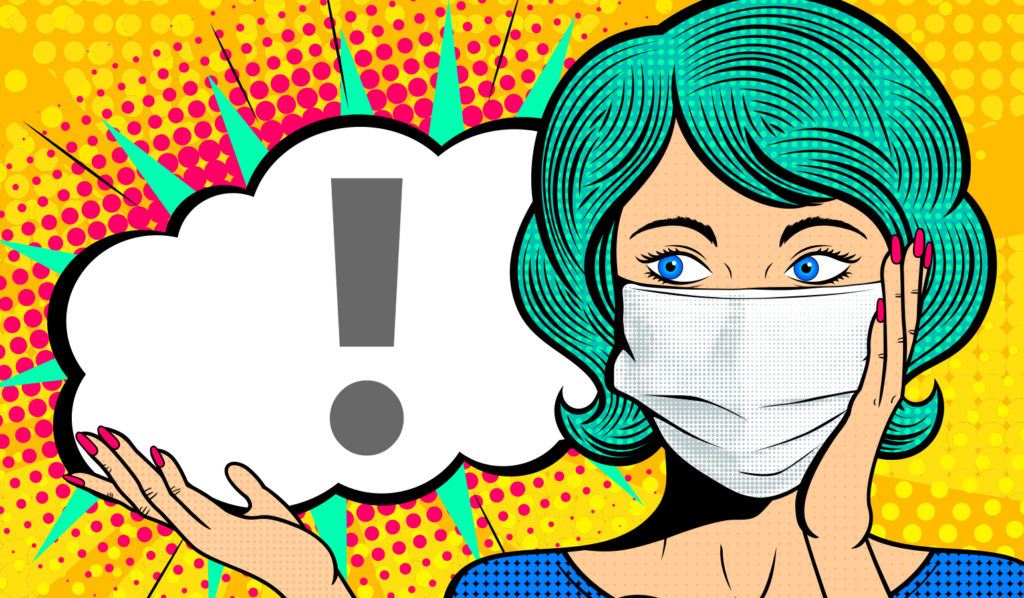Every clinical hour I’ve obtained so far as a student marriage and family therapist has been through masks or computer screens. I have been accruing hours since September of 2021, and I had my first in-person session at the end of November. It is now March of 2022, I am steadily moving towards my 100th hour, and I have yet to have an in-person session without a mask. And frankly, I am not complaining.
Of course, I want the world to feel safe again. I want to feel physically comfortable and, more importantly, therapeutically competent in seeing clients maskless and in person. I know that there is growth to be made, particularly related to my ability to read body language and facial expressions. I know the importance of these factors in the therapy room. My lack of complaints is selfish. Still, I see the ways that this experience has been constructive. I, along with everyone else over the last few years, have heard all about remaining positive in tough times. My view on masks in therapy is a part of that for me.
My supervisor and I coined the term “Little Baby Therapist.” Little Baby Therapist is how I think of myself when I feel intimidated or when the Impostor Syndrome kicks in. My supervisor is adamant that it’s not accurate. In my more confident moments, I know she’s right. I am new at this, but my time and my service are valuable and sufficient. I am educated and thoughtful in what I do, and I am grateful to have supervisors and peers who help me to thrive. Still, as a beginning therapist, it feels easy to be overly critical about the progress I’m making. In my tougher moments, I feel like it should be after my name like a degree: Andrea Kaplan, LBT.
What I needed personally, though, was a moment to think through all of this.
Halfway through my third in-person hour (masked again), my female teenage client mentioned somewhat sexual comments made towards her by a family member. I hadn’t seen it coming, and I knew it was a moment that mattered for both her and myself. It was unexpected; my first experience of stun as a therapist. I knew that I had to take it in stride, to continue helping my client feel comfortable sharing with me so that I could assess the degree of concern and help her through it. What I needed personally, though, was a moment to think through all of this. I needed a minute to process and decide how I wanted to react. Of course, this doesn’t happen; time doesn’t pause because some Little Baby Therapist needs a moment. So, at that moment, I was incredibly grateful for my mask. It gave me one less thing to worry about. Well, the bottom half of it. Because honestly, my jaw gaped. In a weird way, the mask helped me pull my words together. One thing that let me continue being an LBT for a moment longer.
The client was okay, and I assessed, along with my supervisor, that she wasn’t in danger, wasn’t in emotional turmoil, and was unlikely to experience that again. We discussed how she handled it at the time, how she wanted to handle it going forward, and how it affected her emotionally. She was unaware of my shock.
I handled it like a therapist, not an LBT. After that, I was unsure. I felt like I had failed for having a reaction like that. Had I not been wearing my mask, my reaction might have made her uncomfortable and could have potentially harmed the therapeutic alliance. It took time and a deepened connection with my clients for me to come to an accurate and satisfying conclusion: starting my hours with a mask on or behind a screen has been a healthy stepping stone for me in my professional work. Inevitably, I was going to have a reaction like that. It might even eventually happen again. Next time, I will be more capable and more confident because I had this experience and the world didn’t shatter around me. My mask has been one of the things that has given me the space to grow and learn as a therapist. I am growing confident that starting my work with this stepping stone is something I will look back on positively in the future.
I have my first maskless, in-person session next week. Wish me luck!
Andrea Kaplan is a second year MFT student at Hofstra University, a Student member of AAMFT, a member of the Student Leadership Initiative at NYMFTN, and is in her second semester of Practicum at the Joan and Arnold Saltzman Community Services Center at Hofstra.
Other articles
From Mumbai and Virginia Tech to Houston & Haryana: A Global Journey in Family Therapy Education, Training and Practice
I (MP) was born and raised in the small town of Odisha, and was first introduced to family therapy in a post graduate diploma course in Counseling Psychology in Mumbai, a metropolitan city of India.
Manjushree Palit, PhD and Laurie L. Charlés, PhD
Performance-Based Family Therapy: Is anybody better off?
I was a young psychiatry resident at the University of Pennsylvania Medical School; after two years, I could be seen fleeing from the many different models and innovators, including Professor Aaron Beck, founder of Cognitive Behavior Therapy (CBT).
H. Charles Fishman, MD
Contextual Family Therapy with Incarcerated Families
Ten million children have experienced parental incarceration (National Resource Center on Children & Families of the Incarcerated, 2009). Incarceration can disrupt entire family systems, affecting psychological, physical, emotional, and financial well-being (Kitzmiller, Cavanagh, Frick, Steinberg, & Cauffman, 2020; Tadros, Fye, & Ray, 2020).
Eman Tadros, PhD and Antonia Guajardo
